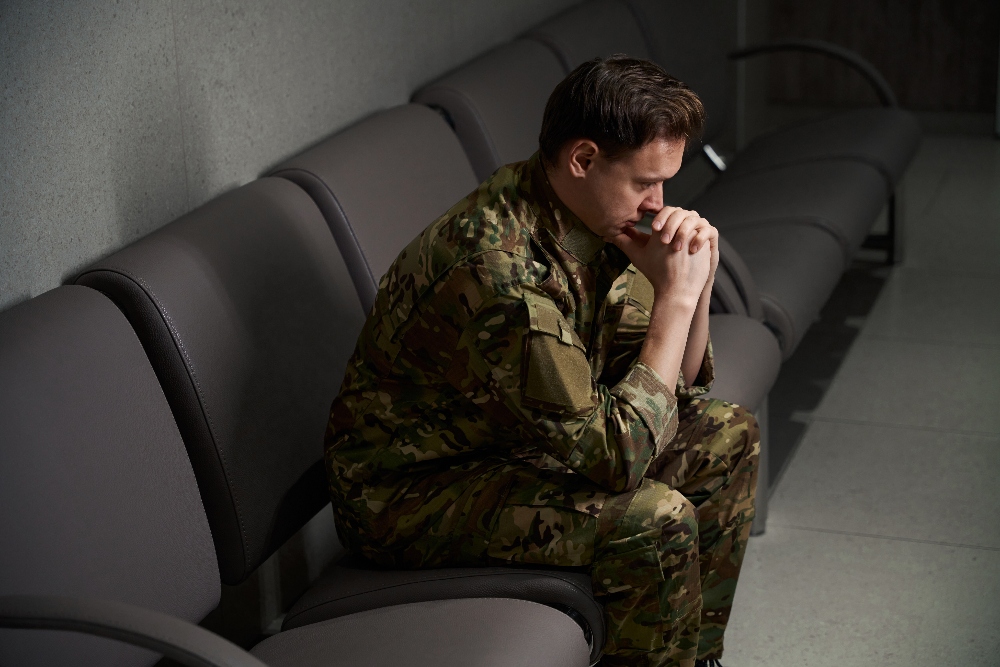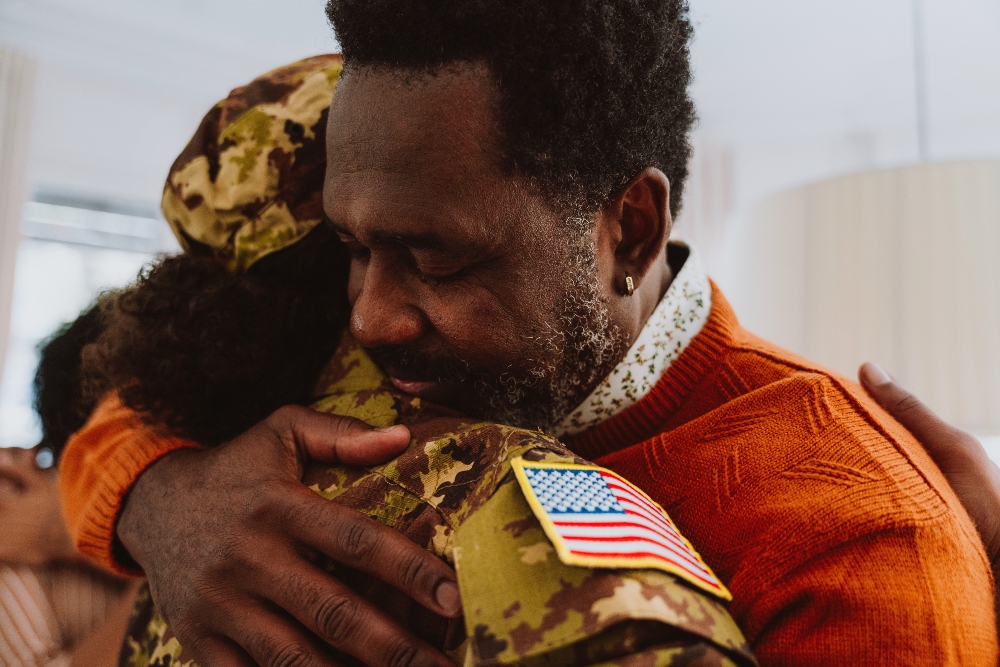The connection between military service and substance use disorders is complex and multifaceted. Veterans face unique stressors during their service and after returning home that can contribute to the development of substance abuse problems. Understanding these challenges is essential for providing effective support and treatment to our nation’s heroes.
Substance Abuse Statistics Among Veterans

The numbers tell a sobering story about substance abuse in the veteran community. More than one in ten veterans have been diagnosed with a substance use disorder, slightly higher than civilian populations.
Veterans who served in Iraq and Afghanistan face particularly high rates of substance abuse, with between 82-93% of veterans who served in Afghanistan and Iraq with an SUD had at least one co-occurring disorder. These statistics aren’t just numbers—they represent real people who served our country and now need our support.
Why Are Veterans at Higher Risk for Substance Abuse?
Understanding why veterans face increased risk for substance abuse requires examining the unique stressors and experiences of military life. Military personnel, including active duty service members, face challenges that can lead to long-term substance use issues even after their period of service ends.
Combat Trauma and PTSD
Combat exposure creates lasting psychological wounds that don’t always heal when service members return home. Different levels of combat exposure can result in varying degrees of trauma, and forms of trauma experienced during military combat deployments can have lasting effects. Post-traumatic stress disorder (PTSD) affects approximately 11-20% of veterans who served in Iraq and Afghanistan. Many veterans turn to alcohol or drugs as a way to numb painful memories, cope with nightmares, or manage hypervigilance and anxiety symptoms.
The connection between PTSD and substance abuse is particularly stark among veterans. Among recent Afghanistan and Iraq veterans, 63% diagnosed with SUDs also met criteria for post-traumatic stress disorder (PTSD). Veterans with PTSD are 2 times more likely to meet the criteria for an alcohol use disorder, 3 times more likely for a drug use disorder, and over 3 times more likely for a nicotine use disorder.
Chronic Pain and Prescription Drug Dependency
Military service often results in physical health issues and injury during deployments that cause chronic pain. Veterans may initially receive prescribed opioids and opioid pain medications for legitimate medical conditions, but the addictive nature of these substances means prolonged use can lead to dependency. Prescription pain medications, including opioid pain relievers, are commonly prescribed to manage service-related injuries.
The misuse of prescription drugs among veterans is a growing concern. Many veterans receive opioid medication and prescription sedative medications for pain management, but without proper monitoring, this can lead to prescription drug abuse. The transition from prescription opioids to illicit substances like heroin or fentanyl is unfortunately common when prescriptions become difficult to obtain or afford.
Difficulty Transitioning to Civilian Life
The structured environment of military life provides clear expectations, strong camaraderie, and a sense of purpose. Civilian life can feel chaotic and isolating by comparison. Veterans may experience a difficult time finding employment, rebuilding relationships, or discovering new meaning and direction in their lives. This transition period can involve financial instability and other stressors that make veterans vulnerable to substance use issues.
Substances can temporarily fill the void left by the loss of military identity and community. The majority of veterans experience some challenges during this transition period, and for some, substances become a way to cope with the stress of adapting to civilian life.
Military Culture and Stigma
Military culture often emphasizes strength, self-reliance, and pushing through adversity without complaint. This mentality, while valuable in combat situations, can prevent veterans from seeking help for mental health or substance abuse issues. The fear of appearing weak or damaged can keep veterans suffering in silence.
For active duty personnel and active-duty military members, seeking help can feel especially challenging due to concerns about career impact. Active duty service members may worry about criminal prosecution or dishonorable discharge if they admit to substance use problems. Even after leaving active-duty military service, these cultural attitudes can persist and create barriers to accessing treatment.
Common Substances of Abuse Among Veterans
Veterans struggling with substance abuse may turn to various substances, each presenting unique challenges and health risks. The prevalence of substance use varies among different veteran populations and military branches.
Alcohol
Alcohol remains the most commonly abused substance among veterans and represents the most prevalent form of substance abuse in this population. Binge drinking and alcohol abuse may begin as a way to decompress after deployment or cope with civilian life stressors. Veterans often have a history of alcohol use that may have started during their service.
A 2017 study found that, compared to their non-veteran counterparts, veterans were more likely to use alcohol (56.6% vs 50.8% in a 1-month period) and to report heavy use of alcohol (7.5% vs 6.5% in a 1-month period).
Male veterans are more than twice as likely to be diagnosed with an alcohol use disorder than female veterans. For veterans struggling with alcohol addiction, specialized alcohol detox programs provide the medical supervision necessary for safe withdrawal.
Prescription Medications
Many veterans have legitimate prescriptions for pain medications, anti-anxiety medications, or sleep aids. However, tolerance can develop quickly, leading to increased doses or using medications in ways other than prescribed. Opioid abuse is a significant problem among veterans, with one study finding that 13% of veterans who received opioids for pain management developed opioid addiction. In 2018, 41,000 veterans were diagnosed with an addiction to prescription painkillers.
The onset of SUDs can occur when veterans begin taking larger amounts of medication than prescribed or continue using medication beyond the recommended period of time. Veterans struggling with benzodiazepine dependency may require specialized benzo detox services, as withdrawal from these medications can be particularly dangerous without proper medical supervision.
Illicit Drugs
Some veterans turn to illegal substances when prescription medications become unavailable or ineffective, developing an addiction to drugs that can create life-threatening addictions. Drug misuse among veterans includes various substances, with marijuana accounting for the vast majority of illicit drug use among veterans with 3.5% reporting use, and 1.7% reporting use of illicit drugs other than marijuana in a 1-month period.
Cocaine and meth addiction also occur within the veteran population, with over 6% of veterans entering treatment facilities for cocaine use.
The Connection Between Mental Health and Substance Abuse in Veterans

Dual diagnosis—the co-occurrence of substance abuse and mental health disorders—is extremely common among veterans. Among Operation Enduring Freedom (OEF) and Operation Iraqi Freedom (OIF) veterans diagnosed with an SUD, 82%–93% were diagnosed with another comorbid mental health disorder. Veterans with an SUD diagnosis were three to four times more likely to receive a PTSD or depression diagnosis, and less than 1% of veterans received an isolated diagnosis of SUD without any diagnosis of a co-occurring disorder.
Veterans with PTSD are significantly more likely to develop substance abuse problems. According to a large national epidemiologic study, 44.6% of individuals with lifetime PTSD also met the criteria for an alcohol use disorder (AUD) or SUD. Veterans who have an SUD are 3-4 times more likely to be diagnosed with depression.
Many veterans also struggle with anxiety disorders, ADHD, bipolar disorder, sleep disorders, and other mental health conditions that require specialized dual diagnosis treatment approaches. Veterans may also experience traumatic brain injuries, which can complicate both substance abuse and mental health treatment.
This interconnection means that effective treatment must address both the substance abuse and underlying mental health conditions simultaneously. Veterans struggling with PTSD alongside substance abuse need specialized care that understands the complex relationship between trauma and addiction. Some veterans may also experience OCD or borderline personality disorder as part of their dual diagnosis. Treating one without the other often leads to relapse to substances and continued suffering.
Breaking Down Barriers to Treatment

Despite the availability of treatment options and numerous resources, many veterans face significant barriers to getting help. Access to treatment remains a challenge for many veterans, particularly those in rural areas.
Stigma and Shame
The stigma surrounding both mental health issues and addiction can prevent veterans from seeking treatment. Many worry that admitting to substance abuse problems will affect their benefits, employment opportunities, or how others perceive their military service. For a veteran in crisis, these concerns can feel overwhelming and prevent them from reaching out for help.
Lack of Understanding from Providers
Not all treatment providers understand the unique experiences and needs of veterans. Generic addiction treatment programs may not address military-specific trauma, the challenges of civilian transition, or the cultural factors that influence veteran behavior. Veterans need providers who understand the military branch they served in, their specific experiences, and the forms of trauma they may have encountered.
Geographic and Financial Barriers
Rural veterans often have limited access to specialized treatment programs. Veterans living in remote areas may have difficulty accessing programs for veterans or finding providers who understand military culture. Financial concerns, even with insurance coverage, can make quality addiction treatment services seem out of reach. Treatment utilization rates remain lower among rural populations due to these barriers.
Specialized Treatment Approaches for Veterans
Effective substance abuse treatment for veterans requires evidence-based treatment approaches that understand and address their unique experiences and needs. The management of SUDs in veteran populations requires specialized knowledge and techniques.
Trauma-Informed Care
Treatment programs must recognize that many veterans have experienced trauma and may be easily triggered by certain situations or approaches. Trauma-informed care creates a safe environment where veterans feel respected and understood rather than judged or re-traumatized.
Evidence-Based Therapies
Several therapeutic approaches have proven particularly effective for veterans struggling with substance abuse. Behavioral interventions and behavioral counseling form the foundation of many treatment programs.
- Cognitive Behavioral Therapy (CBT) helps veterans identify negative thought patterns and develop healthier coping strategies. CBT is especially effective for addressing both PTSD symptoms and substance abuse triggers.
- Dialectical Behavior Therapy (DBT) teaches emotional regulation skills and distress tolerance techniques that can be particularly beneficial for veterans struggling with intense emotions and trauma responses. DBT has shown significant success in treating co-occurring disorders.
- Eye Movement Desensitization and Reprocessing (EMDR) specifically addresses trauma-related symptoms that often contribute to substance abuse. This therapy helps veterans process traumatic memories in a safe, controlled environment.
- Motivational Interviewing respects veterans’ autonomy while helping them explore their own reasons for change. Motivational interviewing is particularly effective with individuals who may be resistant to traditional confrontational treatment methods.
Group Therapy with Fellow Veterans
Peer support from other veterans who understand military experiences can be incredibly powerful. Group therapy sessions with fellow veterans provide a sense of camaraderie and mutual understanding that may be difficult to find elsewhere. Individual therapy remains important for addressing personal trauma and developing customized coping strategies. Self-help groups specifically designed for veterans can also provide ongoing support.
Intensive Outpatient Treatment and Outpatient Services
Many veterans benefit from intensive outpatient treatment programs that allow them to maintain their daily responsibilities while receiving comprehensive care. Outpatient services and outpatient counseling provide flexibility for veterans who cannot commit to residential programs. These programs often include various forms of therapy and support services.
Medication Options and Drug Substitution Therapies
Medication options play an important role in treating veteran substance abuse. Drug substitution therapies, particularly for opioid addiction, can help veterans stabilize their lives while working on recovery. A primary care provider can coordinate with addiction specialists to ensure comprehensive care.
Dual Diagnosis Treatment
Since mental health disorders and substance abuse often co-occur in veterans, integrated treatment that addresses both conditions simultaneously is essential. This comprehensive approach provides better outcomes than treating each condition separately.
Creating a Path Forward: Hope and Recovery

Recovery from substance abuse is possible for veterans, but it requires understanding, specialized care, and comprehensive support. At California Addiction Treatment, we believe that every veteran deserves access to compassionate, effective treatment that honors their service while addressing their unique needs.
What Recovery Looks Like
Recovery for veterans often involves more than just abstaining from substances. It includes:
- Learning healthy coping strategies for managing PTSD symptoms, chronic pain, and civilian life stressors
- Rebuilding relationships with family and friends
- Finding new sources of purpose and meaning in civilian life
- Developing a strong support network of fellow veterans and treatment professionals
- Addressing underlying mental health conditions alongside substance abuse
- Implementing relapse prevention strategies to maintain long-term sobriety
The Importance of Ongoing Support
Recovery is an ongoing process that requires continued support and resources. Veterans benefit from long-term aftercare programs, ongoing therapy, peer support groups, and access to crisis intervention services when needed. Counseling services and ongoing support are crucial for preventing relapse to substances.
Getting Help
If you or a veteran you love is struggling with substance abuse, don’t wait to seek help. Contact California Addiction Treatment today to learn about our specialized programs designed specifically for veterans. Your service to our country deserves recognition, and your recovery deserves support.
If you’re ready to take the first step toward recovery, get in touch with California Addiction Treatment. Our compassionate team understands the unique challenges veterans face and is here to help you find hope, healing, and lasting recovery.




